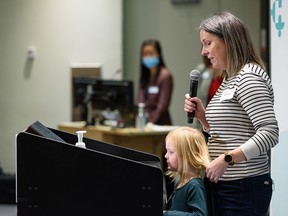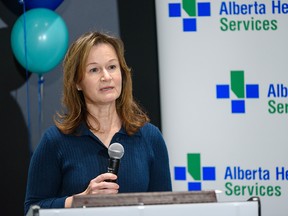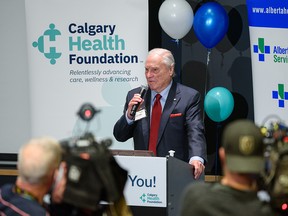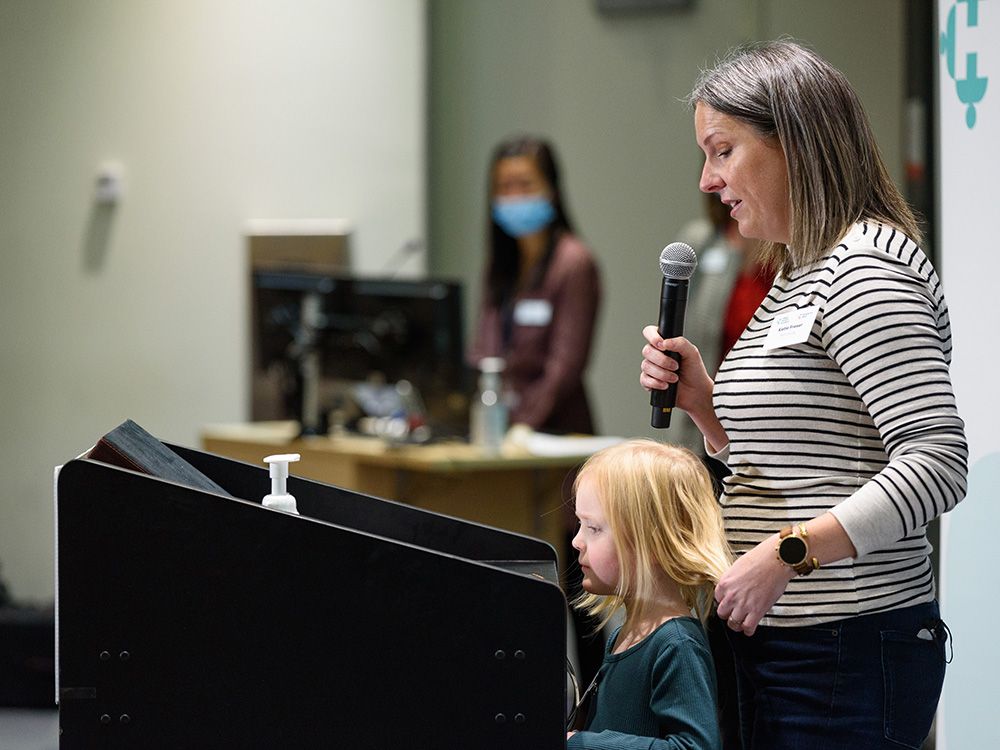Two to three years from now, the existing 38-bed NICU will be rebuilt into a 58-bed, level 3 unit at Foothills Hospital

Article content
When Katie Fraser gave birth 16 weeks prematurely, she struggled to believe her little baby Scarlett would live.
Advertisement 2
Article content
“I thought there’s no way this baby is going to survive,” Fraser said Wednesday.
Article content
“It was a roller coaster of joy and fear, happiness and sadness.”
She was only able to hold her little daughter three days after her birth, she remembers.
But during a news conference at the Foothills Medical Center campus, Scarlett, who arrived in August 2017 weighing 1.5 pounds and spent 113 days in the neonatal intensive care unit (NICU), like most other five-year-olds girls ran across the room.
And her mother marveled at how other families will benefit from a host of donations, including a $10 million gift from the Taylor Family Foundation, which will build a much larger, better-equipped NICU at the medical center.
“It means hope for families who feel like there is nothing. It means hope for babies like Scarlett to not only survive, but thrive,” said Fraser.
Advertisement 3
Article content
The donation pushes the Calgary Health Foundation’s Newborns Need campaign to its $152-million finish line.
Two to three years from now, the existing 38-bed NICU will be rebuilt to a 58-bed, Level-3 unit to serve a community and medical center where 10 percent of newborns require some degree of intensive care.
This is 25 percent higher than the national average, Dr. Alixe Howlett, division chief of neonatology for Calgary, said.
“We don’t really know why (admissions are higher) — if we did, we’d fix it,” Howlett said, adding that about 25 percent of newborns require long NICU stays.

But given that demand, the 25-year-old NICU at the Foothills that now cares for 1,200 babies a year has become inadequate, health care providers say.
Advertisement 4
Article content
“We are the second smallest NICU of its kind in Canada and we are one of the busiest, if not the busiest,” Howlett said.
The funding for the new NICU will not only enable it to utilize the latest technology and best practices, it will improve neonatal research, Howlett said.
“We know good research is good for babies and good for families,” she said.
“We will have more space for research and education, and more space for families and their babies.”
It’s crucial to understand the complexities of early brain development, which is as important from 28 weeks of gestation to full term as it is from birth to 18 years of age, Howlett said.
The new NICU will also have improved lighting, noise control and other improved conditions essential to lower the stress levels of newborns, their parents and staff, the doctor said.
Advertisement 5
Article content
It will also provide rooms where postpartum mothers can stay with their newborns, and family areas where parents and their older children can relax in a unit that will reduce the need to transfer babies to other sites.
Construction will not disrupt ongoing neonatal care, the doctor said.
“It’s a transformational gift that we’ve been given,” Howlett said of the donations, as donors Don and Ruth Taylor looked on.

Don Taylor, whose foundation has benefited various education and arts causes in Calgary and elsewhere, said he has never donated to a health care campaign in Calgary.
And until recently, he didn’t know what the acronym NICU meant.
“If I would have heard Scarlett’s story earlier, we could have made this donation faster,” Taylor said.
“But it gives us a lot of satisfaction to be able to do that.”
The development of the new NICU will also allow it to attract “the best and brightest medical professionals,” says Dr. Mark Anselmo, Calgary Zone medical director for AHS.
Of the $152 million in funding, $38 million comes from the provincial government with another $66 million from the Calgary Health Foundation.
BKaufmann@postmedia.com
Twitter: @BillKaufmannjrn

